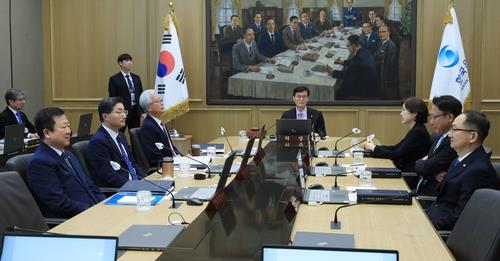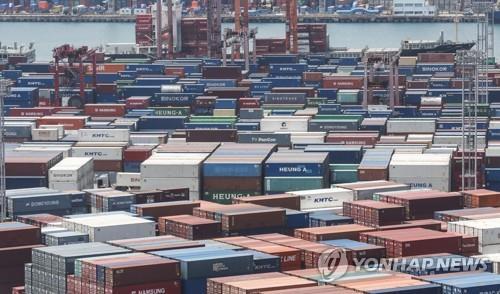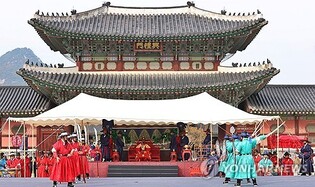(News Focus) US rate freeze-S Korea
 |
| ▲ In this file photo provided by the Bank of Korea, the central bank's monetary board holds a rate-setting meeting at its headquarters in Seoul on May 25, 2023. (PHOTO NOT FOR SALE) (Yonhap) |
 |
| ▲ Finance Minister Choo Kyung-ho (2nd from R) speaks during a meeting in Seoul on June 15, 2023, in this photo released by the Ministry of Economy and Finance. (PHOTO NOT FOR SALE) (Yonhap) |
 |
| ▲ In this file photo, containers for export are stacked at a pier in South Korea's largest port city of Busan, 320 kilometers southeast of Seoul, on May 10, 2023. (Yonhap) |
(News Focus) US rate freeze-S Korea
(News Focus) Fed rate freeze gives dovish BOK breathing room, but woes linger
By Kwak Young-sup
SEOUL, June 15 (Yonhap) -- The U.S. Federal Reserve's rate pause is widely seen as a brief respite for South Korea's dovish central bank amid concerns over the fallout from a high rate gap between the two countries.
Yet the U.S. central bank has signaled borrowing costs in the world's No. 1 economy may rise by as much as half a percentage point by the end of the year, which could trigger capital flight from South Korea and further weaken the South Korean currency.
Analysts say the Fed's possible rate hikes down the road could put the Bank of Korea (BOK) in a quandary over whether it should follow suit to prevent such possible headwinds or stand pat amid a slowing economy.
In a widely expected move, the Fed froze its benchmark rate at a 5 percent-5.25 percent band Wednesday (local time), snapping a 10-month streak of rate hikes since March last year.
The Fed, however, hinted that it may hike the federal funds rate further during the remainder of 2023, noting it "remains highly attentive to inflation risks" and projecting the rate could rise to 5.6 percent by the end of the year.
Last month, the BOK kept its benchmark seven-day repo rate unchanged at 3.5 percent, the third straight month of a rate freeze, as it trimmed this year's growth estimate in the face of an extended slowdown in exports amid easing inflationary pressure.
Commenting on the Fed's move, a senior BOK official said the central bank will keep close tabs on its impact on the possibility of wider financial volatility at home and abroad.
"There is a need to heed the Fed's hint at additional rate hikes within the year, despite the rate freeze," Deputy BOK Gov. Lee Seung-heon told an ad-hoc meeting. "The BOK will closely monitor for a possible rise in financial volatility amid rate hikes in other major economies."
South Korea said it will closely monitor the financial market amid lingering uncertainties about the monetary policies of major countries.
"The government remains committed to maintaining a vigilant approach and closely monitoring both domestic and global financial markets, given the existing uncertainties surrounding the monetary policies of major countries, including the United States," Finance Minister Choo Kyung-ho said during a meeting with economy-related ministers.
The Fed's rate hike has again stoked worries that foreign investors may move their money out of South Korea in pursuit of higher returns.
Currently, the gap in benchmark interest rates between South Korea and the U.S. remains at 1.75 percentage points, but that is widely tipped to widen to as high as 2.25 percentage points in the coming months, given the Fed's hint at further rate increases.
Market watchers voice concerns that a wider rate difference could lead to capital flight from Asia's fourth-largest economy, which in turn would cause the local currency to depreciate against the U.S. dollar.
In light of such a scenario, South Korea's central bank will have no choice but to rack its brains over how to respond to the U.S. central bank's expected hawkish stance, they say.
"With the rate reversal lasting longer, closer attention should be paid to its impact on the exchange rate of the won and the greenback, as well as the local stock market," said Cho Young-moo, a researcher at the LG Economic Research Institute.
"When it comes to monetary, the BOK is expected to face a bumpier road than ever this year as the Korean economy is losing steam," he added.
Indeed, the BOK has brushed aside any idea that it should not be able to jack up the country's borrowing costs due to the Korean economy's slowdown amid plunging exports.
Although BOK Gov. Rhee Chang-yong has stressed that it will not "mechanically respond to the rate gap between South Korea and the U.S.," but observers point out that it is virtually out of the question for the BOK to turn a blind eye to the pressure of a weakening local currency and an outflow of foreign funds.
Most of all, the BOK would have to seriously consider a rate increase should a rate gap send the Korean currency tumbling against the greenback, which would result in higher prices for imported goods.
That could in turn add fuel to South Korea's consumer prices that have been stabilizing after peaking months ago, watchers said.
After a May rate-setting meeting, Gov. Rhee told reporters that the central bank's board members had left the door open for an additional rate hike as core inflation was not slowing as much as had been expected.
Yet the BOK may face such hurdles to its rate hikes as South Korea's economic slowdown amid falling exports and a possible financial crisis related to the country's real estate sector, according to analysts.
South Korea's economy managed to grow 0.3 percent in the first quarter of this year largely thanks to a sustained recovery in private spending amid an extended slowdown in exports.
But the country's trade surplus has been in the red for 15 months running due to slumping exports to China, with its deficit reaching US$2.1 billion.
Last month, the BOK cut its growth outlook for South Korea to 1.4 percent from a 1.6 percent expansion predicted three months earlier, citing sluggish overseas shipments.
Market watchers also said the central bank may be reluctant to swing to a hawkish bias as a large number of property loans are feared to turn sour amid a long real estate slump.
In addition, the BOK may find it hard to push for rate hikes down the road, citing consumer prices that have been leveling off in recent months, they added.
South Korea's consumer price growth slowed for the fourth consecutive month in May, rising 3.3 percent from a year ago. It was a 19-month low and compared with a 3.7 percent on-year rise a month earlier.
(END)
(C) Yonhap News Agency. All Rights Reserved





















![[풀영상] 지니 TV '아이돌아이' 제작발표회|최수영 SNSD SOOYOUNG·김재영 Kim Jaeyeong|'I DOL I' Press Conference](/news/data/20251216/p179563204418999_319_h.jpg)















